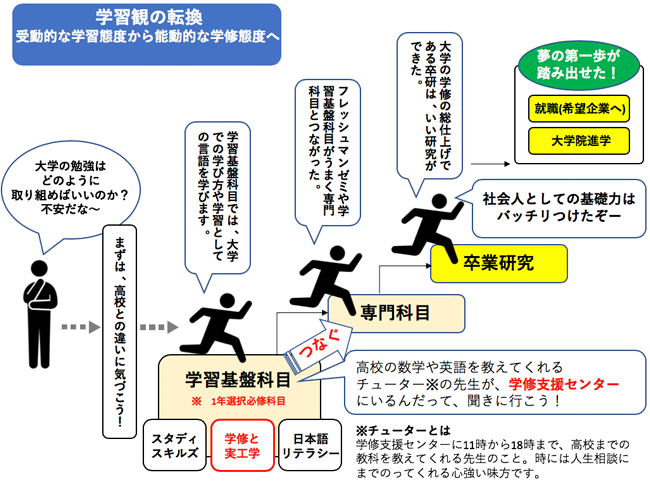"Learning basics" to make specialized subjects meaningful
"Learning basic subjects" are subjects that foster students' positive, autonomous, and independent learning attitudes, and acquire the knowledge that is the basis of learning for specialized subjects.The university offers "Study Skills," "Japanese Literacy," and "Study and Practical Engineering."
In "Study Skills", you will acquire the Japanese proficiency required at the university by listening to lectures, reading and understanding textbooks, reading necessary information from materials, and writing reports. In "Japanese literacy", you will learn writing skills and knowledge of Japanese, and tackle the task of writing sentences. In "learning and practical engineering", communication skills will be improved through tasks such as "thinking while discussing" and "presenting what you have made".

For example, in the "learning and practical engineering" that I was in charge of, the aim was for students to understand the "differences in learning" between high school and university, and to smoothly proceed to the "practical engineering education" that is the policy of this university. ..Raise interest in practical engineering through group work and learning inside and outside the classroom, and acquire the thinking ability as an excellent project leader and the basic skills of manufacturing.
Classes will be preparatory lessons that enhance autonomy and independence, and will also emphasize overtime learning such as preparing for the next lesson and organizing a portfolio to investigate questions to be asked after the lesson.In addition, based on "examining, summarizing, discussing, and presenting" by active learning, pair work, group work, class work, and presentations are conducted to improve communication skills.

Each theme is "improvement of communication ability" to know one's characteristics and understand friends, "manufacturing practice" to raise interest and make by one's own hands, and in group work, discuss and announce the utilization of AI and IoT. Classes include "learning from cutting-edge technology", "Japanese manufacturing" that considers specialized fields from research presentations on manufacturing masters, and "safety education, engineering ethics, and corporate ethics" that give an overview and consider problems from corporate accident cases. Some have introduced LTD (Learning Through Discussion) learning methods.The feature is that the lesson design is always "connecting" to the learning of specialized subjects with "manufacturing" as the keyword, and the habit of preparation and review is developed, which leads to the change of the learning view to learn independently.
In the student questionnaire that was actually taken (in the spring semester of 2018, 518 out of 403 students answered 84), 4% of the students answered that they "grown up (through class)", showing a certain effect.It can be said that the accumulation of the basics of the first year makes the four years of university life meaningful.

